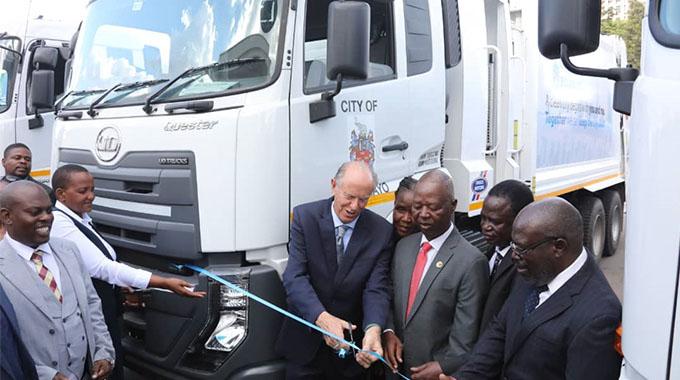News / National
BCC sinks US$600,000 on 4 refuse compactors
21 hrs ago | Views

Bulawayo City Council (BCC) has invested over US$600,000 in the acquisition of four new refuse compactors to strengthen its refuse collection capacity and improve service delivery throughout the city. The investment brings the city's fleet of refuse compactors to 17, though the council has emphasized the need for a total of 30 trucks to adequately cover all areas.
At a commissioning ceremony held at the City Hall parking lot yesterday, Bulawayo Mayor Councillor David Coltart expressed his pleasure in unveiling the new compactors. He noted that while the addition of four trucks may seem modest, it represents a crucial step in the ongoing process of rebuilding the city.
"I stand here this afternoon with a great deal of pleasure in commissioning these four trucks, which to some people might look like a small number, but we need to understand that we are in the process of rebuilding the city, which doesn't happen overnight," said Clr Coltart. "We will rebuild the city step by step, and the commissioning of these refuse compactors is a significant step in my view."
Clr Coltart commended the council management and councillors for their emphasis on responsible use of ratepayers' money. He stressed the importance of transparency and accountability in public spending, assuring residents that their contributions are being used wisely to improve services rather than being squandered on unnecessary expenditures.
"It is important for residents to see tangible results from the rates they pay. Their contributions are not being squandered on luxury personal vehicles but are being used to enhance service delivery," Clr Coltart said.
The mayor highlighted that the new refuse compactors, each costing US$150,600, totalled an expenditure of US$602,400. While acknowledging the positive impact of the investment, Clr Coltart also pointed out that more needs to be done to fully address the city's refuse collection challenges.
Dr Edwin Mzingwane, BCC's Director of Health Services, outlined the current shortage of refuse trucks, stating that the city requires a total of 30 compactors to meet the needs of all areas, including industrial zones. He noted that the central business district (CBD) alone requires three trucks working daily, while business premises need two trucks to maintain cleanliness.
"The four trucks will bring the total number of refuse compactors to about 17, but some of the trucks are 10 or more years old," Dr Mzingwane said. He added that despite the new additions, the city would continue to work with private refuse collection companies to supplement its efforts.
Dr Mzingwane also expressed gratitude to the city's health services department for maintaining cleanliness in Bulawayo, despite the challenges posed by the shortage of refuse collection vehicles.
In conclusion, while the acquisition of new refuse compactors is a positive development, the council is aware that it must continue to invest in expanding its fleet and improving waste management systems to meet the growing demands of the city's population and businesses.
At a commissioning ceremony held at the City Hall parking lot yesterday, Bulawayo Mayor Councillor David Coltart expressed his pleasure in unveiling the new compactors. He noted that while the addition of four trucks may seem modest, it represents a crucial step in the ongoing process of rebuilding the city.
"I stand here this afternoon with a great deal of pleasure in commissioning these four trucks, which to some people might look like a small number, but we need to understand that we are in the process of rebuilding the city, which doesn't happen overnight," said Clr Coltart. "We will rebuild the city step by step, and the commissioning of these refuse compactors is a significant step in my view."
Clr Coltart commended the council management and councillors for their emphasis on responsible use of ratepayers' money. He stressed the importance of transparency and accountability in public spending, assuring residents that their contributions are being used wisely to improve services rather than being squandered on unnecessary expenditures.
"It is important for residents to see tangible results from the rates they pay. Their contributions are not being squandered on luxury personal vehicles but are being used to enhance service delivery," Clr Coltart said.
Dr Edwin Mzingwane, BCC's Director of Health Services, outlined the current shortage of refuse trucks, stating that the city requires a total of 30 compactors to meet the needs of all areas, including industrial zones. He noted that the central business district (CBD) alone requires three trucks working daily, while business premises need two trucks to maintain cleanliness.
"The four trucks will bring the total number of refuse compactors to about 17, but some of the trucks are 10 or more years old," Dr Mzingwane said. He added that despite the new additions, the city would continue to work with private refuse collection companies to supplement its efforts.
Dr Mzingwane also expressed gratitude to the city's health services department for maintaining cleanliness in Bulawayo, despite the challenges posed by the shortage of refuse collection vehicles.
In conclusion, while the acquisition of new refuse compactors is a positive development, the council is aware that it must continue to invest in expanding its fleet and improving waste management systems to meet the growing demands of the city's population and businesses.
Source - the chronicle













































